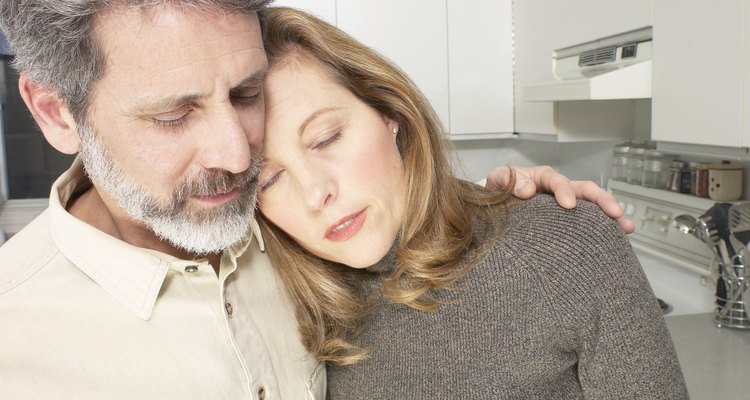
Hemera Technologies/AbleStock.com/Getty Images
The death of a loved one can leave you feeling empty and alone. While grieving is a natural reaction to your loss, the process can make it hard for you to face your daily responsibilities and find enjoyment in life. You might even feel like the grief will last forever. However, while you will never forget the impact your loved one had on your life, there are strategies to help you cope with death and move toward acceptance.
Expect to be flooded with various emotions. You might anticipate depression, but emotions such as denial, anger, humiliation, guilt and confusion are also common reactions for grieving individuals, reports Mental Health America of York and Adams Counties in the article "Coping with Bereavement." Expect your moods to fluctuate, and understand that this is perfectly natural. In time, your moods will become more stable again.
Grieve with others, suggests HelpGuide.org in the article, "Coping with Grief and Loss." Rather than isolate yourself, talk to family members or friends who were also close to your lost loved one. Make connections at the funeral or wake, and consider that you can also provide a shoulder to lean on for others who are experiencing the same sense of loss.
Take care of yourself, reminds Mental Health America. You might experience difficulty sleeping or lack of motivation, but remember to eat healthy, exercise and maintain your hygienic routines. Avoid the use of drugs or alcohol, which might be tempting for grieving individuals. Keep in mind that these seemingly easy escapes can delay your emotional healing and cause physical troubles as well.
Seek counseling if you feel it's necessary. Not everyone will need counseling, but if you continue to experience intense grief months after your loss, you should consult a mental health expert. This is a condition known as complicated grief. Symptoms include long-term yearning for the deceased, intrusive thoughts, denial, extreme bitterness and feelings of emptiness, HelpGuide explains.
Maintain a sense of humor, especially when remembering your loved one. For example, recall some of his jokes or funniest moments and share them with others who are grieving. Humor is a powerful coping mechanism that can help you move toward acceptance. According to a 2008 study, "Humor, Laughter & Happiness in the Daily Lives of Recently Bereaved Spouses," psychology researchers discovered that 61 percent of participating widows and 39 percent of widowers over the age of 50 were surprised by the humor they could enjoy five to 24 weeks after the death of a loved one.
Related Articles

Depression After the Death of a Spouse

Losing an Uncle

Stages of Grief After a Relationship

How to Get Over a Husband Kissing ...

What to Do When a Spouse Leaves You

The Effects on a Man Whose Mother Died ...

Psychological Effects of Losing a ...

How to Overcome an Abusive ...

How to Deal With a Bipolar Woman

10 Steps to Overcoming an Abusive ...

How to Help Your Husband With the Death ...

How Do I Help My Ex-Husband Move On?

How to Get Over a Broken Heart from ...

Lasting Effects on Adult Children of ...

Tips for Forgiving Your Best Friend

How to Get Closure After Someone's Death

Dating a Man Who Is Losing His Mother ...

How to Cope With Disappointment From a ...

How Do I Get Over the Pain of Being ...

About Narcissistic Men
References
Writer Bio
Mitch Reid has been a writer since 2006. He holds a fine arts degree in creative writing, but has a persistent interest in social psychology. He loves train travel, writing fiction, and leaping out of planes. His written work has appeared on sites such as Synonym.com and GlobalPost, and he has served as an editor for ebook publisher Crescent Moon Press, as well as academic literary journals.
Photo Credits
Hemera Technologies/AbleStock.com/Getty Images